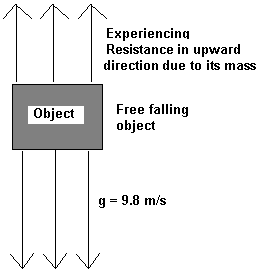Is it because of the upward force that stops the object? for example-

Is it because of the upward force that stops the object? for example-

OK, based on the comments I interpret the question as
Universal gravitation tells us that the gravitation force on a heavy object is larger than that on a light object, so why doesn't the heavy one fall faster?
Start with Newton's gravitation (as simplified for objects in the neighborhood of the Earth's surface):
$$ F_g = mg $$
The answer arises from another of Newton's observations: the second law
$$ F = ma $$
The speed at which something falls is a colloquial term. More rigorously we talk about the acceleration which is the $a$ above. Setting the forces above equal, it becomes obvious that the acceleration due to gravity is
$$ a_g = \frac{F_g}{m} = \frac{mg}{m} = g $$
Notice that the $m$'s cancel out. This is because mass is coefficient that connects force and acceleration and the "charge" equivalent for the gravitational force.
The big object has more inertia.
If you have a big object and a small object, the gravitational force on the big object is greater. Why, then, doesn't it fall faster?
The answer is that the big object needs more force to accelerate the same way. This is actually quite obvious if you view it in a different context.
For example, suppose you have a compact car and a school bus. Which one needs a bigger engine? The school bus, of course. You need more force to accelerate a bigger thing. This is summarized by saying the school bus has more inertia.
Next, we drop the small car and the school bus off a cliff. Which one falls faster? There is more gravitational force on the school bus, but you also need more force to get the school bus going, so it is not obvious which of these effects will win.
It turns out that the extra force on the school bus is just enough to cancel its extra inertia. The bus and car fall at the same rate.
In Newtonian mechanics, this is a coincidence. It was later explained by the equivalence principle, a feature of general relativity.
I'will avoid the use of the concept of Inertia because quoting WP-Inertia
There is no single accepted theory that explains the source of Inertia.
I'will avoid the use of equations because they describe and do not explain.
I will answer to the question:
If you have an object with more mass (heavier) than other object the gravitational force on the heavier object is greater. Why, then, doesn't it fall faster? The concept of mass can have different meanings that, only in pratical terms, are the measure of the same property.
The answer begs to use the 'gravitational passive mass' concept.
To simplify the anser I assume that they are made of the same substance and one has the double of mass of the other.
Question: Why an object have more mass than the other?
Answer: Because it has the double of particles of the other.
With this simplification we see that it is valid Mass = Number of Particles.
(In this problem the mass of each particle is 1 unit of mass)
Further simplification: One body has two particles and the other only one.
'Body 1' 'Body 2'
Two particles OO One Particle O
Gravit Force || |
Ground || |
(Where the downward '|' represent the value and direction of the gravitational force)
Each particle is downward atracted with the same value. This is the answer to question as I pose it.
We can not transform || into this | because the force act in parallel
| on 'each particle'
To stress the idea I will transform again the body into other equivalent system (same mass) where each particle is separated from the others:
'Body 1' 'Body 2'
Two particles O O One Particle O
Gravit Force | | |
Ground | | |
And now you can 'see' that there is no chance to add the forces. In other words it is not additive.
Finally : the answer to the original question is a clear NO : The heavier object is NOT more reluctant to get falling down.